最新人教新目标版英语八年级上册Unit9 Can you come to my party Section B1a1f公开课课件
人教版新目标英语八年级上册《Unit 9 Can you come to my party Sect

人教版新目标英语八年级上册《Unit 9 Can you come to my party Section B 1a-1f》教学设计1一. 教材分析人教版新目标英语八年级上册《Unit 9 Can you come to my party Section B 1a-1f》主要围绕着邀请朋友参加聚会展开。
通过本节课的学习,学生能够掌握情态动词 can 的用法,询问和回答能否参加某个活动,并能够运用所学的词汇和句型进行简单的交流。
本节课的内容与学生的日常生活紧密相连,能够激发学生的学习兴趣和积极性。
二. 学情分析八年级的学生已经具备了一定的英语基础,能够听懂并运用一些基本的英语句型进行交流。
但是,对于情态动词 can 的用法以及一些特殊疑问句的构造还相对陌生,需要通过本节课的学习来掌握。
此外,学生在课堂上的参与度和合作意识也是影响教学效果的重要因素。
三. 教学目标1.知识目标:–掌握情态动词 can 的用法,能够正确询问和回答能否参加某个活动。
–学会运用所学的词汇和句型进行简单的交流。
2.能力目标:–能够听懂、说清、读懂关于邀请和参加聚会的对话。
–能够在日常生活中运用所学的句型进行实际交流。
3.情感目标:–培养学生的合作意识和团队精神。
–提高学生对英语学习的兴趣和积极性。
四. 教学重难点•情态动词 can 的用法。
•运用所学的词汇和句型进行简单的交流。
•特殊疑问句的构造。
•如何在实际交流中运用所学的句型。
五. 教学方法1.任务型教学法:通过设置各种任务,引导学生积极参与课堂活动,提高学生的实际运用能力。
2.情境教学法:通过创设各种真实的社交场景,让学生在特定的情境中学习英语,提高学生的交际能力。
3.合作学习法:鼓励学生进行小组合作,培养学生的团队精神和合作能力。
六. 教学准备1.教材:人教版新目标英语八年级上册。
2.多媒体设备:电脑、投影仪、音响等。
3.教学课件:根据教学内容制作相应的课件。
4.教学素材:与本节课主题相关的图片、视频等。
人教版新目标版八年级英语上册 Unit 9 Can you come to my party?单元知识归纳
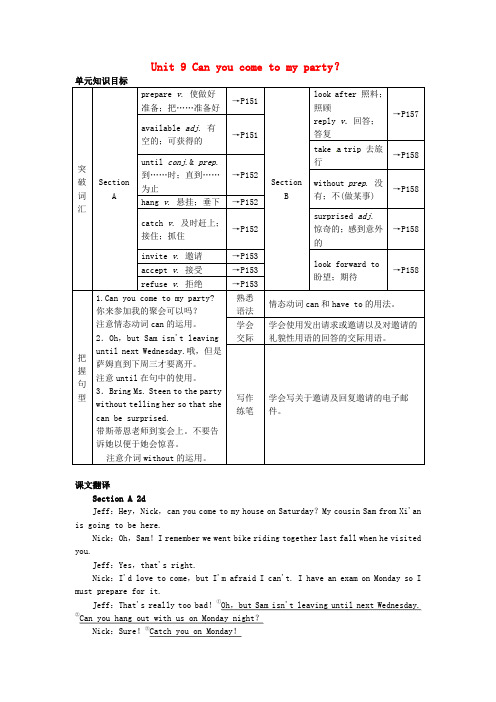
Unit 9 Can you come to my party?突破词汇SectionAprepare v. 使做好准备;把……准备好→P151SectionBlook after 照料;照顾reply v.回答;答复→P157 available adj. 有空的;可获得的→P151take a trip 去旅行→P158 until conj.& prep.到……时;直到……为止→P152without prep. 没有;不(做某事)→P158hang v. 悬挂;垂下→P152catch v. 及时赶上;接住;抓住→P152surprised adj.惊奇的;感到意外的→P158invite v. 邀请→P153look forward to盼望;期待→P158 accept v. 接受→P153refuse v. 拒绝→P153把握句型1.Can you come to my party?你来参加我的聚会可以吗?注意情态动词can的运用。
2.Oh,but Sam isn't leavinguntil next Wednesday.哦,但是萨姆直到下周三才要离开。
注意until在句中的使用。
3.Bring Ms. Steen to the partywithout telling her so that shecan be surprised.带斯蒂恩老师到宴会上。
不要告诉她以便于她会惊喜。
注意介词without的运用。
熟悉语法情态动词can和have to的用法。
学会交际学会使用发出请求或邀请以及对邀请的礼貌性用语的回答的交际用语。
写作练笔学会写关于邀请及回复邀请的电子邮件。
课文翻译Section A 2dJeff:Hey,Nick,can you come to my house on Saturday?My cousin Sam from Xi'an is going to be here.Nick:Oh,Sam!I remember we went bike riding together last fall when he visited you.Jeff:Yes,that's right.Nick:I'd love to come,but I'm afraid I can't. I have an exam on Monday so I must prepare for it.Jeff:That's really too bad!①Oh,but Sam isn't leaving until next Wednesday.②Can you hang out with us on Monday night?Nick:Sure!③Catch you on Monday!杰夫:嘿,尼克,星期六你能来我家吗?我来自西安的表弟萨姆打算到这儿。
人教版新目标八年级上册Unit9-Can-you-come-to-my-part1
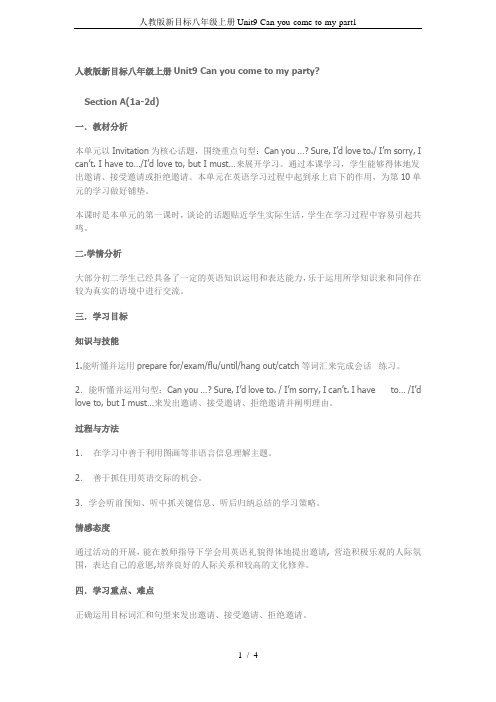
人教版新目标八年级上册Unit9 Can you come to my party?Section A(1a-2d)一.教材分析本单元以Invitation为核心话题,围绕重点句型:Can you …? Sure, I’d love to./ I’m sorry, I can’t. I have to…/I’d love to, but I must…来展开学习。
通过本课学习,学生能够得体地发出邀请、接受邀请或拒绝邀请。
本单元在英语学习过程中起到承上启下的作用,为第10单元的学习做好铺垫。
本课时是本单元的第一课时,谈论的话题贴近学生实际生活,学生在学习过程中容易引起共鸣。
二.学情分析大部分初二学生已经具备了一定的英语知识运用和表达能力,乐于运用所学知识来和同伴在较为真实的语境中进行交流。
三.学习目标知识与技能1.能听懂并运用prepare for/exam/flu/until/hang out/catch等词汇来完成会话练习。
2.能听懂并运用句型:Can you …? Sure, I’d love to. / I’m sorry, I can’t. I have to… /I’d love to, but I must…来发出邀请、接受邀请、拒绝邀请并阐明理由。
过程与方法1.在学习中善于利用图画等非语言信息理解主题。
2.善于抓住用英语交际的机会。
3.学会听前预知、听中抓关键信息、听后归纳总结的学习策略。
情感态度通过活动的开展,能在教师指导下学会用英语礼貌得体地提出邀请, 营造积极乐观的人际氛围,表达自己的意愿,培养良好的人际关系和较高的文化修养。
四.学习重点、难点正确运用目标词汇和句型来发出邀请、接受邀请、拒绝邀请。
五.教学手段多媒体六.教学过程Step1. Warming-upPlay a game named hot potato. Ask students to pass on a ball. The ball is made of several pieces of paper. Play a piece of music. When music stops, the students with the ball peels the paper, read the task on the paper and finish it. On t he last piece of paper, there’s something about the topic of this class—party. Today, let’s learn something more about party.(设计意图:通过一个热身活动,在拉近师生距离、了解学生学情的同时,导入到本节课的课题。
人教版英语八年级上册Unit 9《Can you come to my party》教学设计

人教版英语八年级上册Unit 9《Can you come to my party》教学设计一. 教材分析人教版英语八年级上册Unit 9主要讲述了关于邀请别人参加聚会的情境。
通过本单元的学习,学生能够掌握与聚会相关的词汇和表达方式,学会如何礼貌地邀请别人,并能够用英语进行简单的交流。
本单元的核心句型是“Can you come to my party?”,以及回答“Yes, I can.”和“No, I can’t.”。
二. 学情分析八年级的学生已经具备了一定的英语基础,能够听懂并运用简单的英语进行交流。
他们对学习英语有浓厚的兴趣,并且愿意积极参与课堂活动。
然而,部分学生可能在口语表达和听力方面还存在一定的困难,需要教师的引导和帮助。
三. 教学目标1.知识目标:学生能够掌握与聚会相关的词汇和表达方式,学会如何礼貌地邀请别人,并能够用英语进行简单的交流。
2.能力目标:学生能够听懂并运用核心句型“Can you come to my party?”进行交流,提高口语表达能力。
3.情感目标:学生能够在课堂上积极参与,培养合作意识和团队精神。
四. 教学重难点1.重点:学生能够听懂并运用核心句型“Can you come to my party?”进行交流。
2.难点:学生能够正确使用情态动词“can”来表达自己的能力。
五. 教学方法1.情境教学法:通过创设真实的聚会情境,激发学生的学习兴趣,提高他们的口语表达能力。
2.交际法:通过小组讨论和角色扮演等方式,培养学生的合作意识和团队精神。
3.任务型教学法:通过完成各种任务,引导学生主动参与学习过程,提高他们的自主学习能力。
六. 教学准备1.教学材料:教材、多媒体课件、录音机、磁带或音频文件。
2.教学环境:教室布置成聚会场景,悬挂气球、彩带等装饰物。
七. 教学过程1.导入(5分钟)教师以提问的方式引导学生回顾已学过的与聚会相关的词汇,如“birthday party”、“house party”等。
人教新目标版八年级上册 Unit 9 Can you come to my party-单元检测题 含答案

人教新目标版八年级上册Unit 9 Can you come to my party?单元检测题一、单项选择。
1.—Hi,Linda!Can you come to my house this afternoon? We can play computer games at home.—________I have to do my homework.A.Sorry.I'm not available. B.When can I go to your house?C.What kind of games? D.Sure,I'd love to.2.She doesn't feel well because she eats________meat.A.much too B.too much C.too many D.many too3.—Let's________this weekend.—Good idea!Xu Song is my favorite singer.A.play tennis B.go to the doctor C.have soccer games D.go to the concert 4.—When did you go to bed last night?—I didn't go to bed________my mother got home.A.until B.after C.when D.by5.I didn't catch the bus yesterday.I ________walk three kilometers to wait for another bus. A.was able to B.had to C.should D.might6.—I have too much homework.I can't go to your party.—________.A.That's too bad B.I'm sorry C.Sure,you can't D.Why can't you come 7.—________?—It's Saturday the 15th.A.What's the date B.What time is it C.What day is it today D.What's today 8.Jenny is not busy today,so she________Joe's invitation for lunch.A.accepted B.made C.refused D.replied9.I'm afraid I can't come tomorrow,maybe________.A.the other times B.the other time C.other time D.another time10.I am looking forward to________you.A.hearing from B.hear from C.hearing D.hear二、词汇。
人教版新目标八年级上册Unit_9_Can_you_come_to_my_party_Section_A_2

3. until conj. & prep. 到„„时;直到„„为止 not … until 直到„„才 e.g. Go straight down the street until you see the bank. 一直走,直到你看见银行。 He didn’t go home until he finished his work. 直到完成工作后他才回家。
10. 不,她没有空。她必须去看医生。 No, she’s ____ not _________. available She ______ must ___ go to the _______. doctor 11. 他们能去看电影吗? ____ Can they ____ go to the _______? movies 12. 不,他们没有空。他们可能必须去见朋 友。 free They _____ might _____ have No, they’re not ____. ___ to meet their ________. friends
2.I’m sorry, I’m not available. 真抱歉,我没有空。 此句中的available 表示“ 有空;不忙; 有时间交谈或聊天”, 其后还可用 to do 引 出具体的事情。例如: Are you available tomorrow morning? 明天早上你有空吗? I’m afraid I’m not available to help with the school show on the 19th. 我怕是没空来帮着准备学校19号的演出了。
lessons when I came into the office.
我进办公室时,我们的英语老师在备课。
当宾语是食物之类的东西时,可译为 “制;做 ”
人教版英语八年级上册unit9 Can you come to my party(含答案)

八年级上unit9 Can you come to my party?(含答案)一.单项选择1.—It’s too late. I have to go now. —Oh, it’s raining outside. Don’t leave________it stops.A. sinceB. untilC. while2. —Dad, must we wait until the light becomes green?—Yes, I’m afraid we________. That’s the traffic rule.A. canB. mayC. have toD. Need3. —Can you give us more examples? —OK, I’ll give you_______example now.A. otherB. the otherC. anotherD. others4 My family has two dogs. One is white, _____is black.A.otherB. anotherC. the otherD. others5.—Jenny, can you come to my birthday party on Sunday? —Sure, _______.A.I’d loveB. I can’tC. I’d love toD. I have to6.—Why are you so tired these days? —Well, I have_____work to do.A.too muchB. too manyC. much tooD. so many7.John didn’t go to bed______the football match on TV was over last night, so he was sleepy now.A.becauseB.untilC. ifD. but8.—Can you go shopping with me this afternoon, Linda?—_____. I must study for my English test.A.I hope soB. I’m afraid notC. SureD. I’d love to9.—Would you please see the film Iron Man3 with me tonight, Kate?—I’d love to, but I’ve_______Linda’s invitation to dinner.A.sufferedB. earnedC. receivedD. accepted10.H e may refuse______such a silly question.A.answerB. answeredC. answeringD. to answer11.T he speech contest will start_____2: 00pm______Friday afternoon.A. at; inB. at; onC. in; onD. at; at12. —What are you going to do this evening?—I’m not sure. I_____watch TV at home.A. mustB. have toC. mightD. should13. —______are you going to the mountains with on Sunday, Tom? —My friends.A. WhenB. WhatC. WhereD. Who14. —Jim,_______you go and play basketball with us now?—Sorry, I can’t. I have to clean my room at home.A. AreB. CanC. MustD. Do15. We have to_______ourselves when we are away from home.A. look atB. look forC. look upD. look after16. —I’m looking forward to_______my parents soon. What about you?—Me too.A. seeingB. seeC. sawD. to see17. I couldn’t do it________your great help. Thanks a lot!A. withB. withoutC. forD. to18 .One important aim of our school is to prepare us for the future_____ we can face all theA.so farB. so thatC. even ifD. if only19. Alice kept_______all day because she lost her favourite toy.A.gladB. sadC. surprisedD. tired20.We all know that fish can’t live_______water.A.withB. afterC. byD. without21.Jonson is looking forward to________the Great Wall next year.A.visitedB. visitC. visitsD. visiting22.The girl saved every coin_______she could buy her father a present on Father’s Day.A. ifB. in order toC. so thatD. because23. _______wonderful concert they are putting on in the movie theater!A. HowB. WhatC. What aD. What an24. I’ll invite all my friends_______my birthday party.A. withB. atC. inD. to25. The football match______on the evening of next Saturday in the city gym.A. wasB. willC. will beD. be26. —_______go for a picnic this weekend. —Good idea.A. Can youB. What aboutC. When do youD. Let’s27. The final exam is coming. I________try my best to study for it.A. mustB. mightC. needD. would28. The students are very ______ at the ______ news.A. surprised;surprisingB. surprising;surprisedC. surprised;surprisedD. surprising;surprising29. She spends ______ time (in) watching TV. It is bad for her eyes.A. much tooB. too manyC. too muchD. many too30. —Must I be home before nine o'clock, Mom?— No, you ________. But you have to come back before ten o'clock.A.needn't B.can't C.mustn't D. shouldn’t二.用所给词的适当形式填空1.Julia_______(have) to help her mother do the housework on weekends.2.Thanks a lot for_______(show) me around your school.3. —Are you free_______(hang) out with me this afternoon?—No, I’m not free. I might visit my grandparents.4.—Hi, Tim. When______you_______(finish) your homework? —About in half an hour.5. We’re______(plan) to play basketball after school.6. I’m glad that Vincent accepted the______(invite).7. All of us are making________(prepare) for the end-of-year party.8. I'm very sorry ______(hear)that you are ill.9. My cousin is looking forward to________(find) a good job soon.10. Ms. Yang went out of the room without__________(say) anything.11. Thanks for your ______ (prepare) for the party.12. I would love ______(make)friends with new students.13. —Can he go to the baseball game?—No,he can't.He has to ______(study)for a test.14. We ______(catch) some fish last Friday.三.先选词并用其适当形式填空A.catch, exam, flu, prepare, available1.The final_______is coming. All the students are working hard for it.2.Linda has to go to the doctor this afternoon because she has the________.3. Walk ahead, please. I’ll________you up soon.4. —Can you come over to my house this weekend? —Sorry, I’m not_______. I have to help my parents.5. —What are you busy doing now? —Well, I’m busy_______for the English party.B.weekday, what, look after, have, study1.We usually go to work on________and have a rest on weekends.2.He can’t play soccer with us this afternoon. He________a piano lesson.3.I can’t go shopping with you, Julie. I have to______for my Englis h exam.4.Julie’s mother is ill. She must________her in the hospital.5. —_______is today? —It’s Tuesday the12th.C. concert, guest, daytime, open, event1.I would like to invite you to the______of our new school.2.Nancy enjoys music. I bought her a ticket to the_______on her birthday.3.The hotel now opens to the____.4.People work in the______and sleep at night.5. The band usually plays for school______, such as School Day, School Music Festival and so on.四.按要求改写句子1. It’s twelve o’clock?(对画线部分提问)_____ ______ is it?2.I got a letter from my pen pal in Australia last night.(改为同义句)I ______ ________ my pen pal in Australia last night3.The meeting starts 10:00.(对画线部分提问)______ ______the party______?4.She has to go to see the doctor.(改为否定句)She ______ __________ to go to see the doctor.5.People in that town have to move to a new place.(改为一般疑问句)______ people in that town ______ ______ move to a new place?八年级上unit9 Can you come to my party?一.单项选择1-5.BCCCC 6-10.ABBDD 11-15.BCDBD 16-20.ABBBD21-25.DCCDC 26-30.DAACA二.用所给词的适当形式填空1.has2.showing3.to buy4.will finish5.planning6.invitation7.preparations8.to hear9.finding 10.saying 11.preparation12.to make 13.study 14.caught三.先选词并用其适当形式填空A. 1.exam 2.flu 3.catch 4.available 5.preparingB. 1.weekdays 2.has 3.study 4.look after 5.WhatC. 1.opening 2.concert 3.guests 4.daytime 5.events四.按要求改写句子1.What time2.heard,from3.When,does,start4.doesn’t,have5.Do,have,to。
(新版)人教新目标版八年级英语上册 Unit 9 Can you come to my party
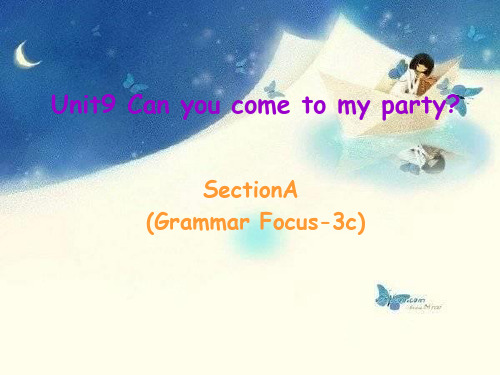
•
11、人总是珍惜为得到。2021/5/32021/5/32021/5/3M ay-213-May-21
•
12、人乱于心,不宽余请。2021/5/32021/5/32021/5/3Monday, May 03, 2021
•
13、生气是拿别人做错的事来惩罚自 己。2021/5/32021/5/32021/5/32021/5/35/3/2021
Can you go to the movies
_S_u_r_e_. That sounds great. / __I_’_m____
__t_o_m__o_r_ro_w__n_i_g_h_t_?______________ _a_f_r_a_id__n_o_t_. _I_h_a_v_e_t_h_e_f_l_u_.(我恐怕
•
17、一个人即使已登上顶峰,也仍要 自强不 息。2021/5/32021/5/32021/5/32021/5/3
谢谢大家Βιβλιοθήκη MON. TUE. WED. THUR. FRI. SAT. SUN.
1. Thank you for inviting me.(改为同意句)
Thanks for asking me.
2. Jeff can join the baseball game.(改为否定句)
Jeff can’t join the baseball game.
__C_a_n__s_h_e_g_o__to__th_e__b_a_s_e_b_a_ll_g_a_m__e_?_ __g_o_t_o_t_h_e__d_o_c_to_r__.(她没有空,她
(她能去参加棒球比赛吗?)
必须要去看医生。)
__C_a_n__th__ey__g_o_t_o__th_e__m_o_v_i_e_s_?_____ (他们能去看电影吗?)
人教新目标八年级上册英语《Unit 9 Can you come to my party?》Sect
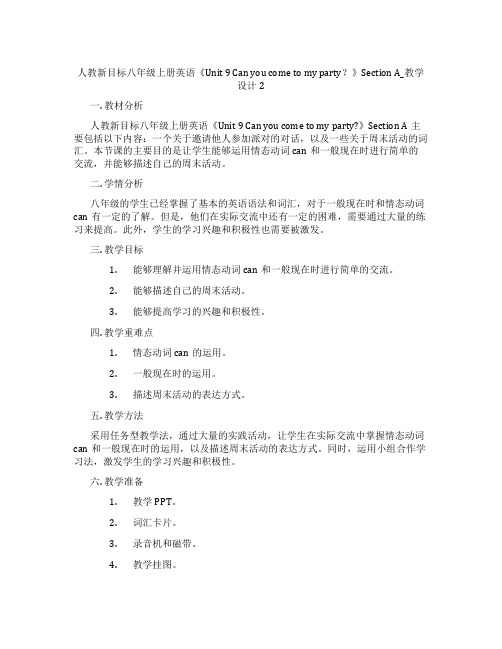
人教新目标八年级上册英语《Unit 9 Can you come to my party?》Section A_教学设计2一. 教材分析人教新目标八年级上册英语《Unit 9 Can you come to my party?》Section A主要包括以下内容:一个关于邀请他人参加派对的对话,以及一些关于周末活动的词汇。
本节课的主要目的是让学生能够运用情态动词can和一般现在时进行简单的交流,并能够描述自己的周末活动。
二. 学情分析八年级的学生已经掌握了基本的英语语法和词汇,对于一般现在时和情态动词can有一定的了解。
但是,他们在实际交流中还有一定的困难,需要通过大量的练习来提高。
此外,学生的学习兴趣和积极性也需要被激发。
三. 教学目标1.能够理解并运用情态动词can和一般现在时进行简单的交流。
2.能够描述自己的周末活动。
3.能够提高学习的兴趣和积极性。
四. 教学重难点1.情态动词can的运用。
2.一般现在时的运用。
3.描述周末活动的表达方式。
五. 教学方法采用任务型教学法,通过大量的实践活动,让学生在实际交流中掌握情态动词can和一般现在时的运用,以及描述周末活动的表达方式。
同时,运用小组合作学习法,激发学生的学习兴趣和积极性。
六. 教学准备1.教学PPT。
2.词汇卡片。
3.录音机和磁带。
4.教学挂图。
七. 教学过程1.导入(5分钟)通过播放一段关于派对的音频,引导学生谈论派对,激发学生的学习兴趣。
2.呈现(10分钟)利用PPT展示本节课的主要内容,包括对话和词汇。
让学生跟读对话,熟悉词汇。
3.操练(15分钟)将学生分成小组,每组分配一张词汇卡片,让学生用情态动词can和一般现在时进行交流,描述卡片上的词汇。
教师巡回指导,纠正发音和语法错误。
4.巩固(10分钟)让学生在小组内互相提问,用情态动词can和一般现在时描述自己的周末活动。
教师巡回指导,纠正发音和语法错误。
5.拓展(10分钟)让学生自由发挥,用情态动词can和一般现在时编写一段对话,描述自己和他的朋友的周末活动。
人教新目标版八年级上册Unit_9_Can_you_come_to_my_party__Section_B_2__3a-Self_check[1]
![人教新目标版八年级上册Unit_9_Can_you_come_to_my_party__Section_B_2__3a-Self_check[1]](https://img.taocdn.com/s3/m/cbef7373a26925c52cc5bf5a.png)
___________________________________
___________________________________ ___________________________________
写作指导:
本题要求学生们写作两个小作文,一个是 写一个邀请他人参加某聚会或活动的信函; 另一个是答复你伙伴的邀请信。 首先,认真阅读邀请信所包含的内容:聚 会或活动的类型;举办的时间与地点;客人 的着装;客人是否须带东西;客人是否须答 复此信;何时及如何答复此信。 参照3a写一个包含上述内容的邀请信,注 意运用右栏中的提示词语。
4. They can enjoy the school concert. 由邀 请信的第三句可知。
5. Yes. They should bring one book as a gift for the new library. 由邀请信的倒数 第二句话,可知答案。 6. They should reply in writing to this invitation by Friday. 由邀请信的最后一 句可知答案。
Fill in the blanks with the right words. Ms. Steen is a fun teacher. She’s going back to the US soon. So, all the students are very ____. sad To show how much they’re going to ____ miss her, David wants to have a _______ surprise ____ party for her next Friday the 28th. He needs prepare the some students to help him ________ party.
最新人教新目标版英语八年级上册Unit9 Can you come to my party公开课课件

2a. Listen and circle can or can’t.
1. Jeff can/ can’t go to the party.
2. Mary can/ can’t go to the party. 3. May can/ can’t go to the party.
4. Mei Ling can/ can’t go to the party.
Monday Tuesday Wednesday Thursday Friday Saturday Sunday
B: When is it?
go to the doctor practice the piano help with the housework prepare for an exam meet my friend visit my grandparents available
Tim Anna Kay Wilson
1c. Group work
A: Can you come to my party on Saturday afternoon? B: Sure, I’d love to. C: Sorry, I can’t. I have to prepare for an exam. D: I’m sorry, too. I must go to the doctor.
1. Prepare for an exam a 2. help my parents 3. go to the doctor 4. meet my friend
e d b c
5. have the flu
1b Listen and write the names (Tim, Kay, Anna and Wilson) next to the correct students in the picture.
人教版新目标英语八年级上册《Unit 9 Can you come to my party Sect

人教版新目标英语八年级上册《Unit 9 Can you come to my party Section B 1a-1e》教学设计1一. 教材分析人教版新目标英语八年级上册《Unit 9 Can you come to my party Section B 1a-1e》主要讲述了邀请朋友参加聚会的情景。
本节课主要让学生掌握情态动词can的用法,能够用can提问和回答邀请,以及表达自己和他人的喜好。
通过本节课的学习,学生能够提高听力、口语、阅读和写作能力。
二. 学情分析八年级的学生已经具备一定的基础知识,对于情态动词have和do的用法有一定的了解。
但学生在实际应用中,尤其是在听力方面还需加强。
此外,学生对于西方的聚会文化可能了解不多,需要在教学中进行适当的引导和拓展。
三. 教学目标1.知识目标:学生能够掌握情态动词can的用法,能够用can提问和回答邀请,以及表达自己和他人的喜好。
2.能力目标:学生能够提高听力、口语、阅读和写作能力。
3.情感目标:通过本节课的学习,学生能够学会礼貌地邀请他人参加聚会,提高人际交往能力。
四. 教学重难点1.重点:学生能够掌握情态动词can的用法,能够用can提问和回答邀请,以及表达自己和他人的喜好。
2.难点:学生能够在实际情景中正确运用情态动词can,尤其是在听力方面。
五. 教学方法1.任务型教学法:通过设置各种真实的任务,让学生在完成任务的过程中运用所学知识。
2.交际法:通过模拟真实的交际情景,让学生在实际交流中提高口语能力。
3.视听法:利用多媒体教学资源,提高学生的听力能力。
六. 教学准备1.教师准备:备好相关教学材料,如PPT、听力材料、练习题等。
2.学生准备:预习本节课的内容,了解基本的聚会文化。
七. 教学过程1.导入(5分钟)教师通过提问方式引导学生回顾情态动词have和do的用法,为新课的学习做好铺垫。
2.呈现(5分钟)教师播放听力材料,让学生听懂并理解邀请他人参加聚会的情景。
人教新目标八年级上册英语《Unit 9 Can you come to my party?》Sect

人教新目标八年级上册英语《Unit 9 Can you come to my party?》Section B_教案3一. 教材分析人教新目标八年级上册英语《Unit 9 Can you come to my party?》Section B 主要围绕邀请朋友参加聚会展开。
本节课通过学习一般现在时的特殊疑问句及其回答,使学生能够运用所学知识进行实际交流。
本节课的内容与学生的生活紧密相连,有利于激发他们的学习兴趣和参与欲望。
二. 学情分析八年级的学生已经掌握了英语学习的基本语法和词汇,具备一定的听、说、读、写能力。
对于一般现在时的疑问句及其回答,大部分学生已经有所了解,但仍有部分学生掌握不牢固。
在导入环节,教师可以通过与学生互动,了解他们在生活中参加聚会的情景,以便更好地激发他们的学习兴趣。
三. 教学目标1.知识目标:学生能够掌握一般现在时的特殊疑问句及其回答;2.能力目标:学生能够在实际情景中运用所学知识进行交流;3.情感目标:培养学生热爱生活、积极参与社交活动的态度。
四. 教学重难点1.重点:一般现在时的特殊疑问句及其回答;2.难点:一般现在时在实际情景中的运用。
五. 教学方法采用任务型教学法、情景教学法和分组合作学习法,让学生在实际情景中感知、实践、运用语言知识,提高他们的听、说、读、写能力。
六. 教学准备1.教具:多媒体课件、黑板、粉笔;2.教材:人教新目标八年级上册英语《Unit 9 Can you come to myparty?》Section B;3.辅助材料:与本节课相关的生活场景图片、活动卡片等。
七. 教学过程1.导入(5分钟)教师通过提问学生:“Do you like parties? Why?”引导学生谈论聚会话题,激发他们的学习兴趣。
同时,教师板书课题《Can you come to my party?》,引入新课。
2.呈现(10分钟)教师利用多媒体课件展示一组聚会场景图片,引导学生观察并回答问题:“What are they doing? Can you come to my party?”学生根据图片内容和已学知识进行回答。
人教新目标八年级上册英语《Unit 9 Can you come to my party?》Sect

人教新目标八年级上册英语《Unit 9 Can you come to my party?》Section A_教案1一. 教材分析本节课为人教新目标八年级上册英语《Unit 9 Can you come to my party?》Section A。
本节课主要围绕邀请朋友参加聚会这一主题,学习一般现在时的疑问句和回答,以及情态动词can的用法。
通过本节课的学习,学生能够听懂、会说、会写本节课的重点单词和句型,并能够运用所学知识进行实际交流。
二. 学情分析八年级的学生已经具备了一定的英语基础,对于一般现在时和情态动词有一定的了解。
但是,学生在口语表达和听力理解方面还存在一定的问题,需要通过大量的练习来提高。
此外,学生对于如何运用英语进行实际交流还不够熟练,需要通过情景模拟和角色扮演等方式来进行锻炼。
三. 教学目标1.知识目标:学生能够掌握本节课的重点单词和句型,理解一般现在时的疑问句和回答,以及情态动词can的用法。
2.能力目标:学生能够听懂、会说、会写本节课的内容,并能够运用所学知识进行实际交流。
3.情感目标:学生能够积极参与课堂活动,提高学习英语的兴趣。
四. 教学重难点1.重点:一般现在时的疑问句和回答,以及情态动词can的用法。
2.难点:一般现在时的疑问句和回答的构成和用法,情态动词can的用法。
五. 教学方法本节课采用任务型教学法,通过情景模拟、角色扮演、小组合作等方式,让学生在实际语境中运用所学知识,提高学生的听、说、读、写能力。
六. 教学准备1.教师准备:准备好本节课的PPT,编写相关的练习题和听力材料。
2.学生准备:预习本节课的内容,熟记重点单词和句型。
七. 教学过程1.导入(5分钟)教师通过提问学生喜欢的活动,引导学生谈论聚会的话题,从而引入本节课的主题。
2.呈现(10分钟)教师通过PPT展示本节课的重点单词和句型,并用简单的解释和例子来帮助学生理解。
3.操练(10分钟)教师学生进行小组活动,让学生用英语进行自我介绍,并邀请同学参加聚会。
八年级英语上册 Unit 9 Can you come to my party短语、语法知识点汇总 (新版)人教新目标版
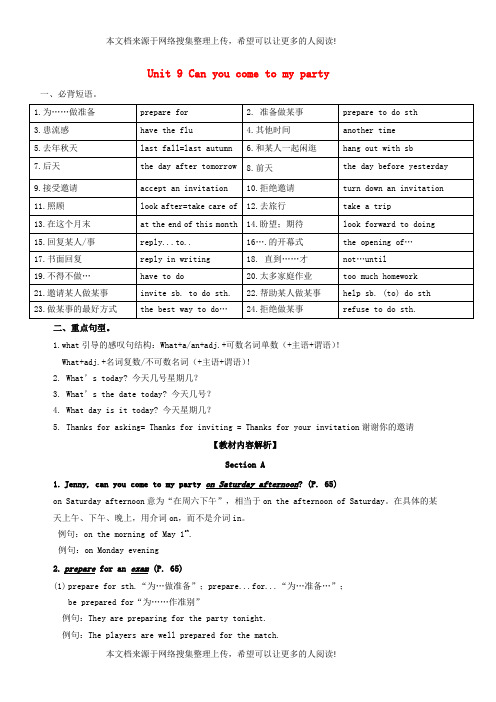
Unit 9 Can you come to my party一、必背短语。
二、重点句型。
1.what引导的感叹句结构:What+a/an+adj.+可数名词单数(+主语+谓语)!What+adj.+名词复数/不可数名词(+主语+谓语)!2. What’s today?今天几号星期几?3. What’s the date today?今天几号?4. What day is it today? 今天星期几?5. Thanks for asking= Thanks for inviting = Thanks for your invitation谢谢你的邀请【教材内容解析】Section A1.Jenny, can you come to my party on Saturday afternoon? (P. 65)on Saturday afternoon意为“在周六下午”,相当于on the afternoon of Saturday。
在具体的某天上午、下午、晚上,用介词on,而不是介词in。
例句:on the morning of May 1st.例句:on Monday evening2.prepare for an exam (P. 65)(1)prepare for sth.“为…做准备”;prepare...for...“为…准备…”;be prepared for“为……作准别”例句:They are preparing for the party tonight.例句:The players are well prepared for the match.(2)exam作名词,表示“考试”,take/have an exam参加考试。
例句:We will take the final exam next week.3.I’m sorry. I’m not available. (P. 66)available作形容词,表示“有空的、可利用的”,常用作表语,相当于free。
人教版新目标英语八年级上册《Unit 9 Can you come to my party Sect
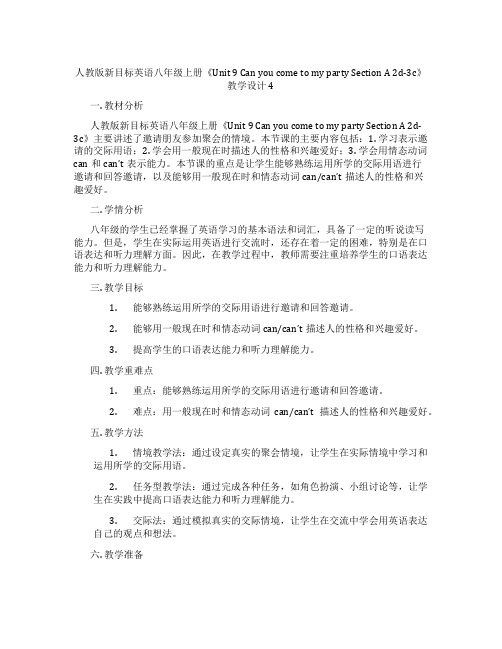
人教版新目标英语八年级上册《Unit 9 Can you come to my party Section A 2d-3c》教学设计4一. 教材分析人教版新目标英语八年级上册《Unit 9 Can you come to my party Section A 2d-3c》主要讲述了邀请朋友参加聚会的情境。
本节课的主要内容包括:1. 学习表示邀请的交际用语;2. 学会用一般现在时描述人的性格和兴趣爱好;3. 学会用情态动词can和can’t表示能力。
本节课的重点是让学生能够熟练运用所学的交际用语进行邀请和回答邀请,以及能够用一般现在时和情态动词can/can’t描述人的性格和兴趣爱好。
二. 学情分析八年级的学生已经掌握了英语学习的基本语法和词汇,具备了一定的听说读写能力。
但是,学生在实际运用英语进行交流时,还存在着一定的困难,特别是在口语表达和听力理解方面。
因此,在教学过程中,教师需要注重培养学生的口语表达能力和听力理解能力。
三. 教学目标1.能够熟练运用所学的交际用语进行邀请和回答邀请。
2.能够用一般现在时和情态动词can/can’t描述人的性格和兴趣爱好。
3.提高学生的口语表达能力和听力理解能力。
四. 教学重难点1.重点:能够熟练运用所学的交际用语进行邀请和回答邀请。
2.难点:用一般现在时和情态动词can/can’t描述人的性格和兴趣爱好。
五. 教学方法1.情境教学法:通过设定真实的聚会情境,让学生在实际情境中学习和运用所学的交际用语。
2.任务型教学法:通过完成各种任务,如角色扮演、小组讨论等,让学生在实践中提高口语表达能力和听力理解能力。
3.交际法:通过模拟真实的交际情境,让学生在交流中学会用英语表达自己的观点和想法。
六. 教学准备1.教学课件:制作课件,包括文本、图片、音频和视频等,以便于展示和引导学生学习。
2.教学道具:准备一些与聚会相关的道具,如气球、蛋糕等,以便于创设情境。
3.教学材料:准备一些关于人物性格和兴趣爱好的图片和资料,以便于学生进行描述。
人教新目标八年级上册英语《Unit 9 Can you come to my party?》Sect

人教新目标八年级上册英语《Unit 9 Can you come to my party?》Section A_教案3一. 教材分析人教新目标八年级上册英语《Unit 9 Can you come to my party?》Section A,主要讲述了一个关于邀请朋友参加派对的对话。
本节课主要学习一般现在时的疑问句和回答,以及情态动词can的用法。
通过本节课的学习,学生能够听懂、会说、会读本节课的主要单词和句型,并能运用所学知识进行实际交流。
二. 学情分析八年级的学生已经掌握了基本的英语语法和词汇,对于一般现在时和情态动词有一定的了解。
但部分学生在发音和听力方面还存在困难,需要老师在教学中给予关注和指导。
同时,学生对于实际生活中的邀请和回复还不够熟悉,需要通过本节课的学习来提高这方面的交际能力。
三. 教学目标1.能够正确听懂、说出一般现在时的疑问句和回答。
2.能够熟练运用情态动词can提问和回答。
3.能够运用所学知识进行实际邀请和回复的交流。
4.提高学生的听说能力和团队协作能力。
四. 教学重难点1.一般现在时的疑问句和回答。
2.情态动词can的用法。
3.实际生活中的邀请和回复。
五. 教学方法1.任务型教学法:通过设置不同的任务,让学生在实际操作中运用所学知识。
2.情境教学法:创设生活情境,让学生在真实的环境中学习英语。
3.互动式教学法:引导学生积极参与课堂活动,提高课堂氛围。
六. 教学准备1.教学课件:制作课件,包括本节课的主要单词、句型和听力材料。
2.教学道具:准备一些与派对相关的道具,如气球、蛋糕等。
3.录音机和磁带:准备听力材料的相关录音机和磁带。
七. 教学过程1.导入(5分钟)利用录音机播放一段派对的场景录音,引导学生谈论派对相关的话题,激发学生的学习兴趣。
2.呈现(10分钟)老师通过课件展示本节课的主要单词和句型,如:balloon, cake, can you come to my party? 等,并引导学生跟读。
人教版新目标英语八年级上册《Unit 9 Can you come to my party Sect
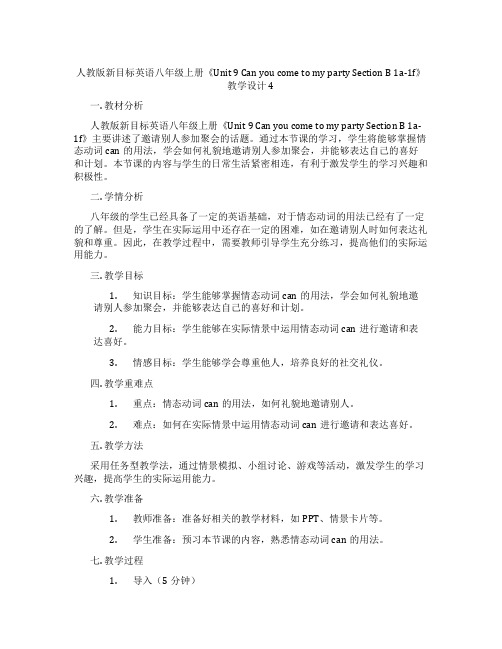
人教版新目标英语八年级上册《Unit 9 Can you come to my party Section B 1a-1f》教学设计4一. 教材分析人教版新目标英语八年级上册《Unit 9 Can you come to my party Section B 1a-1f》主要讲述了邀请别人参加聚会的话题。
通过本节课的学习,学生将能够掌握情态动词can的用法,学会如何礼貌地邀请别人参加聚会,并能够表达自己的喜好和计划。
本节课的内容与学生的日常生活紧密相连,有利于激发学生的学习兴趣和积极性。
二. 学情分析八年级的学生已经具备了一定的英语基础,对于情态动词的用法已经有了一定的了解。
但是,学生在实际运用中还存在一定的困难,如在邀请别人时如何表达礼貌和尊重。
因此,在教学过程中,需要教师引导学生充分练习,提高他们的实际运用能力。
三. 教学目标1.知识目标:学生能够掌握情态动词can的用法,学会如何礼貌地邀请别人参加聚会,并能够表达自己的喜好和计划。
2.能力目标:学生能够在实际情景中运用情态动词can进行邀请和表达喜好。
3.情感目标:学生能够学会尊重他人,培养良好的社交礼仪。
四. 教学重难点1.重点:情态动词can的用法,如何礼貌地邀请别人。
2.难点:如何在实际情景中运用情态动词can进行邀请和表达喜好。
五. 教学方法采用任务型教学法,通过情景模拟、小组讨论、游戏等活动,激发学生的学习兴趣,提高学生的实际运用能力。
六. 教学准备1.教师准备:准备好相关的教学材料,如PPT、情景卡片等。
2.学生准备:预习本节课的内容,熟悉情态动词can的用法。
七. 教学过程1.导入(5分钟)教师通过提问方式引导学生回顾已学过的情态动词,为新课的学习做好铺垫。
2.呈现(10分钟)教师通过PPT展示本节课的主要内容,让学生整体感知文本。
3.操练(10分钟)教师设计情景,让学生进行角色扮演,练习如何用情态动词can邀请别人参加聚会。
